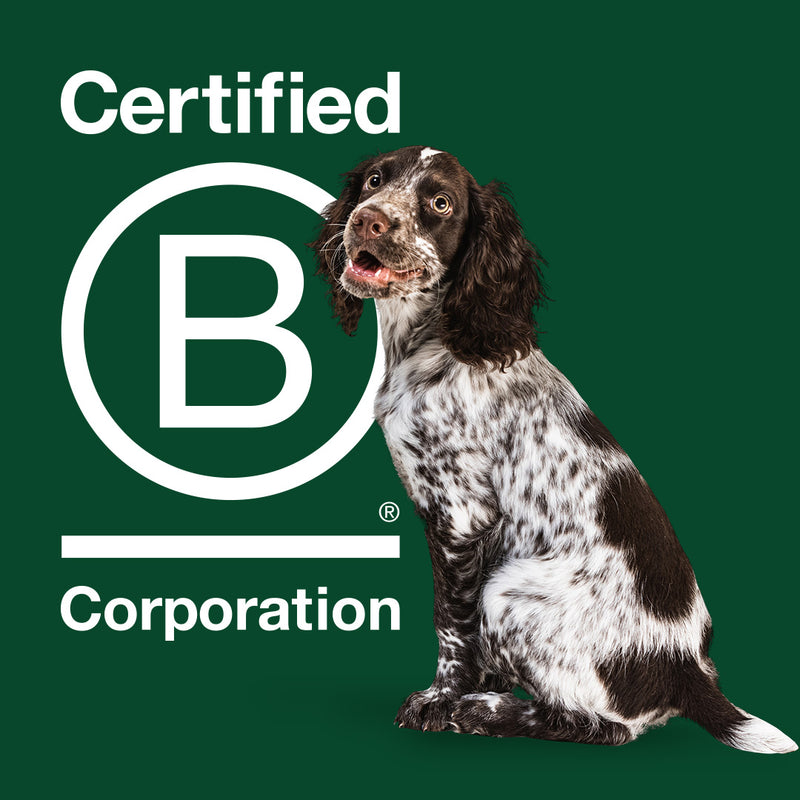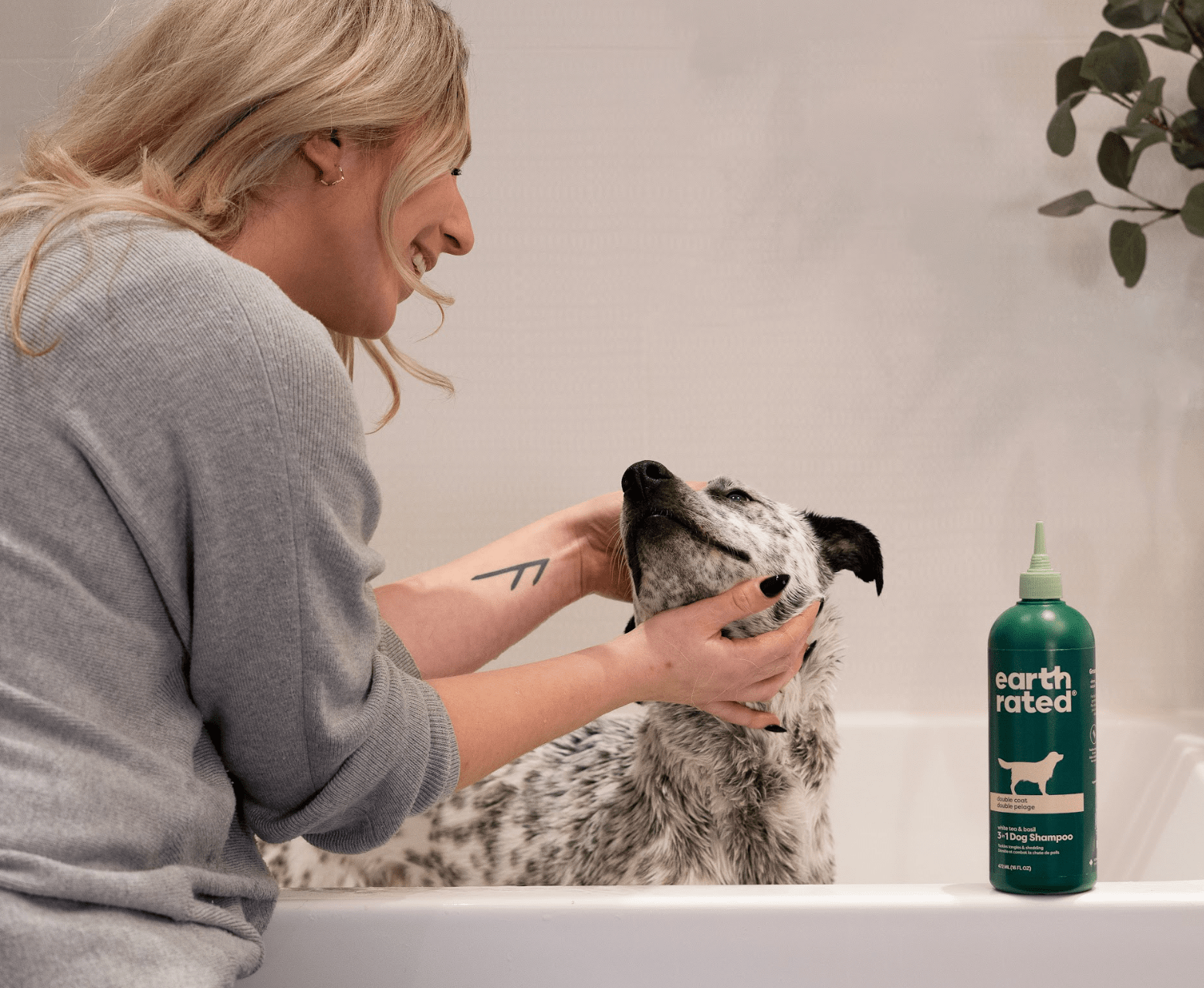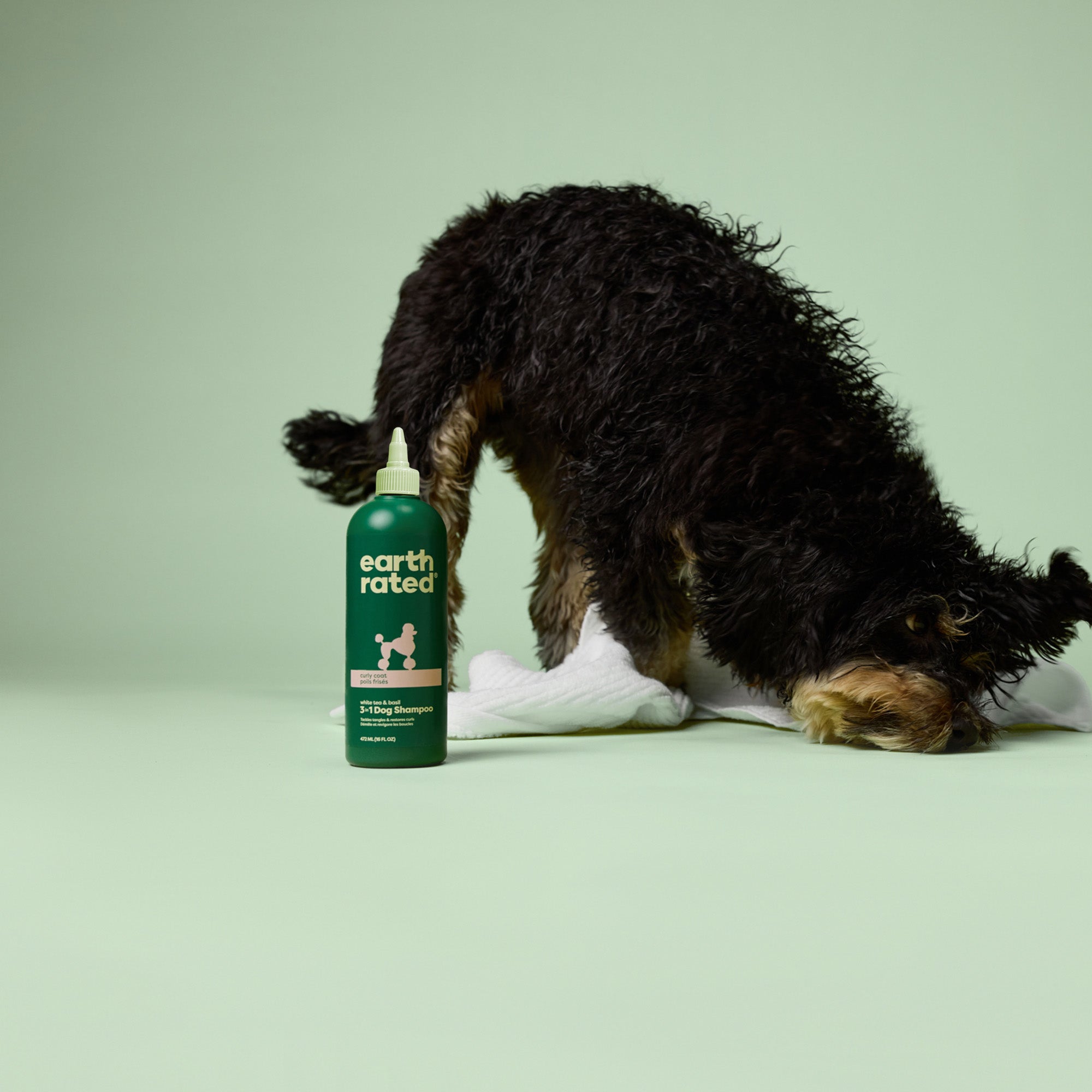Si votre douce fille a soudainement commencé à sentir comme un restaurant de bord de mer, vous vous grattez peut-être la tête et vous vous demandez : « Comment puis-je me débarrasser de l’odeur de poisson de mon chien ? »
🤢 Alerte TMI : les odeurs de poisson chez les chiens sont souvent causées par le fait que leurs glandes anales ne s'expriment pas correctement. La meilleure façon de se débarrasser de cette odeur de poisson est de s'assurer que les glandes anales de votre chien ne sont pas obstruées. « La plupart des chiens libèrent leurs glandes anales d'eux-mêmes, nous suggérons toujours de consulter un vétérinaire si l'expression des glandes est nécessaire », explique Giulia D'Ignazio, toiletteuse et propriétaire de Brandy's Canine Grooming.
Continuez à lire pour en savoir plus sur les raisons pour lesquelles votre chiot a commencé à sentir comme une poissonnerie et comment vous pouvez vous débarrasser de cette odeur.
3 causes courantes d'odeur de poisson chez les chiennes
1. Problèmes de glandes anales
Chaque chien possède deux petits sacs situés de chaque côté de son anus, appelés « glandes anales ». Ces glandes sécrètent un liquide à l'odeur de poisson qui contient des phéromones . Ce sont en fait ces fameuses phéromones que les chiens sentent lorsqu'ils se reniflent les fesses ! Elles aident le chien à communiquer des informations importantes aux autres chiens comme son sexe, son âge, son état de santé et même son statut reproductif.
Normalement, ces sécrétions sont libérées naturellement lorsque votre chien fait ses besoins. Mais certains chiens ont du mal à évacuer leurs glandes anales naturellement en raison d'une mauvaise santé, d'un régime alimentaire et/ou d'autres facteurs. Lorsque cela se produit, le liquide à l'odeur de poisson commence à s'accumuler dans les sacs anaux.
En plus des odeurs de poisson, d’autres signes de problèmes de glandes anales chez les chiens comprennent :
- Trottinette des fesses
- Lécher la région anale
- Mordre la région anale
- Défécation apparemment douloureuse
- Réactivité lorsqu'on leur touche les fesses
Si vous remarquez l'un de ces signes, il est important d'emmener immédiatement votre chien chez le vétérinaire. Les glandes anales qui ne sont pas vidées correctement peuvent se bloquer et être très douloureuses. Dans le pire des cas, les glandes anales peuvent s'infecter, développer des abcès et se rompre.
Il convient de noter que les chiens femelles ET les chiens mâles ont des glandes anales, ce n'est donc pas un problème qui affecte uniquement les chiens femelles.
2. Infections urinaires
Une odeur de poisson peut également indiquer une infection urinaire. Ces infections sont généralement causées par des bactéries comme E. coli ou des levures, comme chez l'homme.
Les infections urinaires bactériennes sont assez courantes et touchent 14 % de tous les chiens, les chiennes étant les plus touchées.
En plus d’une odeur nauséabonde, les symptômes des infections urinaires chez les chiens comprennent également :
- Miction fréquente
- Effort pour uriner
- Accidents dans la maison
- Du sang dans l'urine
- Lécher excessivement la région génitale
Il est important d'emmener votre chien chez le vétérinaire pour un diagnostic précis, car les infections urinaires nécessitent presque toujours un traitement médicamenteux. Votre vétérinaire prescrira probablement des antibiotiques pour traiter une infection urinaire.
3. Problèmes de peau
Les problèmes de peau peuvent également être à l’origine des odeurs de poisson. Les infections à levures, les infections bactériennes et les allergies peuvent toutes avoir une odeur très « distinctive ».
- Infections à levures : On dit souvent que les infections à levures ont une odeur de levure ou même de « fromage ». Les symptômes comprennent des démangeaisons, des rougeurs et une peau squameuse. Souvent, ces infections se produisent dans les plis cutanés et les races de chiens ayant de nombreux plis cutanés sont plus sujettes aux infections à levures que les autres.
- Infections bactériennes : les infections bactériennes peuvent également avoir une odeur étrange. Vous pouvez également remarquer des rougeurs, des gonflements et du pus. Les infections bactériennes courantes comprennent les infections de l'oreille , qui sont plus fréquentes chez les chiens aux oreilles tombantes.
- Allergies : Les allergies peuvent également entraîner des infections si un chien se gratte constamment et crée des points chauds. Par conséquent, les allergies peuvent également provoquer des problèmes d'odeurs, même si ce n'est pas directement.
Tous les problèmes de peau nécessitent un diagnostic et un traitement vétérinaire. Des shampooings médicamenteux, des crèmes topiques et même des médicaments oraux sont parfois nécessaires.
Comment se débarrasser de l'odeur de poisson du chien
La meilleure façon de se débarrasser de l'odeur de poisson de votre chienne est de traiter le problème sous-jacent qui en est la cause. Voici quelques remèdes et traitements maison efficaces pour vous aider à combattre l'odeur.
Toilettage régulier
Le toilettage est essentiel pour maintenir la santé et l'hygiène générale de votre chien, et il joue également un rôle important dans le contrôle des odeurs. Après tout, un chien sale est souvent un chien qui sent mauvais !
Un brossage régulier permet d'éliminer les poils morts, la saleté et les squames qui peuvent contribuer aux problèmes de peau et aux odeurs qui y sont associées. Giulia recommande le shampooing sans rinçage Earth Rated entre les séances de toilettage si votre chien sent particulièrement mauvais.
Pour désodoriser entre les bains, pensez auspray désodorisant de Earth Rated .
De plus, pour les chiens souffrant d'allergies, vous pouvez utiliser les lingettes de toilettage hypoallergéniques Earth Rated pour éliminer rapidement les allergènes du pelage et des pattes de votre chien après sa promenade. Essayez la version parfumée à la lavande pour un regain de fraîcheur supplémentaire.
N'oubliez pas non plus les dents de votre chien ! Les chiens ont besoin de nettoyages dentaires réguliers , tout comme nous. Si vous remarquez une odeur particulièrement gênante provenant de la bouche de votre chien, il peut s'agir d'un problème dentaire sous-jacent , comme un abcès ou une dent infectée. Si c'est le cas, une visite chez le vétérinaire s'impose !
Conseils pour le bain
Le bain régulier de votre chien permet également d’éliminer les odeurs et de garder son pelage propre. « Selon la race du chien, nous suggérons généralement de le faire tous les 3 à 4 mois », explique Giulia.
Si vous devez baigner votre chien plus fréquemment, Giulia recommande d'utiliser un après-shampoing pour réhydrater les huiles naturelles du chien et éviter que sa peau ne se dessèche . La gamme de shampoings pour chiens Earth Rated comprend un après-shampoing dans la formule, ce qui facilite grandement le nettoyage et l'entretien du pelage de votre chien en une seule fois.
Découvrez notre gamme complète de produits de toilettage pour garder votre chien propre et sans odeur. Des lingettes aux shampoings, nous avons tout ce dont vous avez besoin. Découvrez-les maintenant !

Expression des glandes anales
Si l'odeur de poisson de votre chien est due au fait que ses glandes anales ne s'expriment pas naturellement, vous devrez alors consulter un vétérinaire. Votre vétérinaire sera en mesure de diagnostiquer et de traiter la cause du problème des glandes anales ainsi que d'exprimer les glandes manuellement.
Dans certains cas, votre vétérinaire peut vous demander de vider les glandes anales de votre chien à la maison. Il vous montrera d'abord comment procéder afin que vous puissiez apprendre ce que vous devez faire par vous-même. Cette démonstration est très importante car si elle est mal effectuée, les glandes anales peuvent se rompre et provoquer des infections.
En règle générale, l'extraction de la glande anale se fait en appliquant une légère pression sur la glande à l'aide du pouce et de l'index. Une petite quantité de liquide est libérée, vidant ainsi le sac anal et libérant la pression accumulée.
Changements alimentaires
Les problèmes d’expression des glandes anales peuvent être dus à des selles molles n’exerçant pas suffisamment de pression sur les sacs anaux pour provoquer une sécrétion.
Si les selles de votre chien sont assez molles, vous pouvez envisager d’ augmenter son apport en fibres pour produire des selles plus fermes.
De plus, les problèmes de glandes anales sont fréquemment observés chez les chiens en surpoids . Vous devrez peut-être envisager de changer le régime alimentaire de votre chien pour l'aider à perdre du poids.
Certains chiens peuvent sentir le poisson s'ils mangent des aliments à base de poisson. Si votre chien suit un régime à base de poisson, comme du saumon ou de la morue, vous pouvez envisager de passer à une autre saveur.
Traitement médical
Chaque fois que vous remarquez un changement soudain d'odeur, il est toujours préférable de consulter votre vétérinaire. Les mauvaises odeurs soudaines sont souvent le signe de problèmes tels que des infections de l'oreille, des problèmes de glandes anales ou des infections urinaires.
Un vétérinaire peut établir un diagnostic pour votre chien et vous recommander le meilleur traitement médical. En cas de doute, il est toujours préférable de faire examiner votre chien par un vétérinaire.
Pour les chiens sujets aux infections de l'oreille, vous pouvez garder leurs oreilles propres avec les lingettes auriculaires Earth Rated pour aider à éliminer la saleté et la crasse.

3 mesures préventives pour une fraîcheur à long terme
1. Contrôles vétérinaires réguliers
Des visites régulières chez le vétérinaire sont nécessaires pour maintenir la santé de votre chien. Ces visites permettent à votre vétérinaire de détecter les problèmes à un stade précoce, avant qu'ils ne provoquent des problèmes tels que des odeurs de poisson. Au cours de ces visites, votre vétérinaire examinera la peau, les oreilles et les glandes anales de votre chien pour s'assurer que tout fonctionne correctement.
2. Alimentation et compléments alimentaires
Une alimentation équilibrée est également importante pour maintenir la santé générale de votre chien. Ce que votre chien mange peut avoir un impact direct sur son odeur. Donc, si votre vétérinaire déclare que votre chien est en bonne santé mais qu'il sent toujours mauvais, il est probablement temps de revoir son alimentation !
« En général, un régime alimentaire cru est un bon point de départ ou recherchez des croquettes contenant une viande de meilleure qualité », explique Giulia.
Parfois, des suppléments peuvent être utiles pour traiter les mauvaises odeurs :
- Probiotiques : ces bactéries bénéfiques peuvent favoriser la santé digestive et potentiellement réduire les odeurs désagréables. De nombreux aliments pour chiens contiennent des probiotiques, mais vous pouvez également acheter des compléments alimentaires séparés.
- Acides gras oméga-3 : ces graisses saines peuvent améliorer la santé de la peau et du pelage, réduisant potentiellement les infections cutanées (et les odeurs qui les accompagnent).
- Compléments alimentaires à base de fibres : parlez à votre vétérinaire d'un complément alimentaire à base de fibres, par exemple Protexin ProFibre. Cela peut améliorer la consistance des selles de votre chien pour favoriser l'expression des glandes anales.
3. Propreté de l'environnement
Améliorer la propreté de votre maison peut également aider à éliminer les bactéries, la saleté et les allergènes qui provoquent souvent des infections cutanées et des odeurs nauséabondes.
Voici quelques endroits sur lesquels concentrer votre attention :
- Nettoyage fréquent : passez régulièrement l'aspirateur et la serpillère dans les zones de repos préférées de votre chien. Les bactéries peuvent s'accumuler dans ces zones, entraînant des infections et des odeurs. Faites très attention aux endroits humides, comme la literie extérieure, car les levures et les bactéries préfèrent les endroits humides.
- Lavez la literie : la literie de votre chien peut être particulièrement problématique. Assurez-vous de laver les couvertures et tout ce sur quoi votre chien se couche.
- Désinfectez les surfaces : utilisez des désinfectants sans danger pour les animaux pour nettoyer les sols et tout autre endroit auquel votre chien a accès.
- Produits anti-odeurs : pensez à un nettoyant enzymatique conçu pour éliminer les bactéries responsables des odeurs. Ces produits sont très efficaces pour éliminer les odeurs tenaces des tapis et des tissus d’ameublement. Les purificateurs d’air dotés de filtres HEPA peuvent également améliorer considérablement la qualité de l’air en capturant les allergènes et les odeurs.
Garder l'espace de vie de votre chien plus propre est un moyen simple d'aider à éliminer les bactéries responsables des odeurs qui peuvent s'installer sur votre chiot.

Réflexions finales
Souvent, une odeur de poisson émanant de votre chiot signale que quelque chose ne va pas. Des problèmes de glandes anales, des infections urinaires et des problèmes de peau peuvent tous donner à votre chien une odeur comme s'il venait de sortir de la mer. Traiter ce problème de santé sous-jacent peut éliminer l'odeur et empêcher le problème de s'aggraver.
Un toilettage et un bain réguliers sont essentiels pour maintenir la santé générale de votre chien et prévenir les odeurs. Dites adieu aux odeurs de poisson avec nos lingettes de toilettage faciles à utiliser. Gardez votre chien propre et confortable.
Achetez maintenant

FAQ
Comment puis-je empêcher les glandes de mon chien de sentir ?
Pour empêcher les glandes anales de votre chien de sentir mauvais, vous devrez les vider manuellement avec l'aide d'un vétérinaire. Les glandes anales malodorantes ne se vident probablement pas correctement. Les glandes anales qui se remplissent trop et ne s'évacuent pas lorsqu'un chien fait caca peuvent provoquer une mauvaise odeur.
Quel remède maison puis-je utiliser pour me débarrasser de l’odeur de poisson chez mon chien ?
Les remèdes maison pour se débarrasser de l'odeur de poisson de votre chien comprennent : vider manuellement ses glandes anales et augmenter la quantité de fibres dans son alimentation grâce à des légumes ou à un supplément. Améliorer son poids s'il est en surpoids et améliorer la santé de sa peau en ajoutant de l'huile à son alimentation peuvent également aider.












